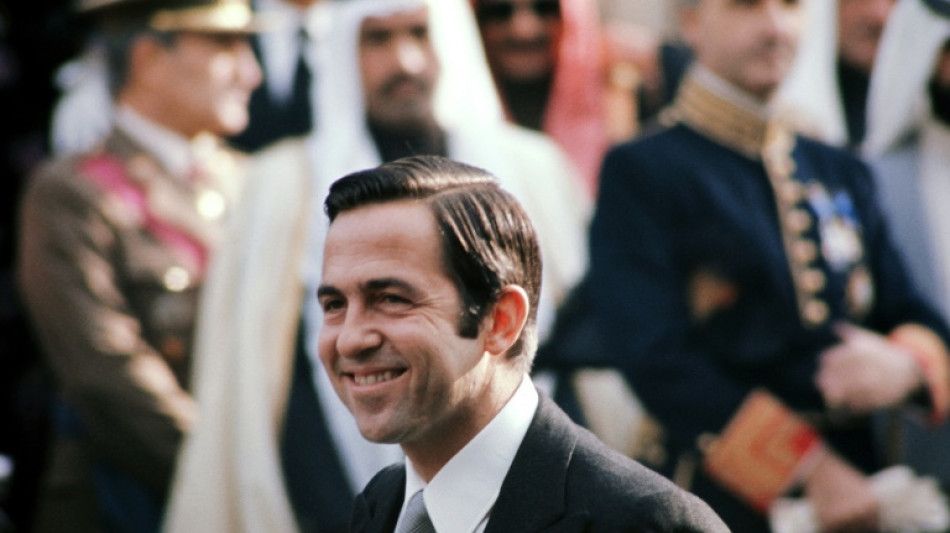
-
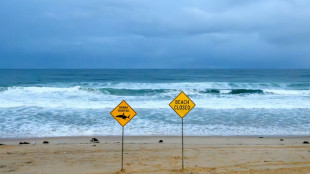 Shark bites surfer in Australian state's fourth attack in 48 hours
Shark bites surfer in Australian state's fourth attack in 48 hours
-
North Korea's Kim sacks vice premier, rails against 'incompetence'
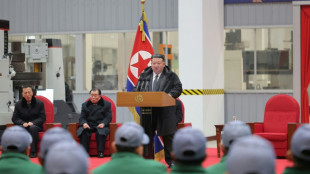
-
 Spain mourns as train crash toll rises to 40
Spain mourns as train crash toll rises to 40
-
'Very nervous' Keys makes shaky start to Australian Open title defence
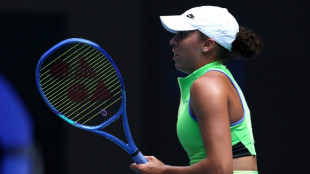
-
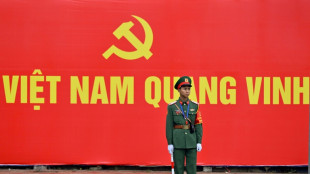 Vietnam leader promises graft fight as he eyes China-style powers
Vietnam leader promises graft fight as he eyes China-style powers
-
Dad-to-be Ruud ready to walk away from Australian Open

-
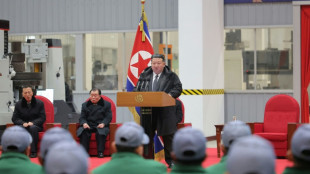 North Korea's Kim sacks senior official, slams 'incompetence'
North Korea's Kim sacks senior official, slams 'incompetence'
-
Farewells, fresh faces at Men's Fashion Week in Paris

-
 'I do not want to reconcile with my family' says Brooklyn Peltz Beckham
'I do not want to reconcile with my family' says Brooklyn Peltz Beckham
-
EU leaders take stage in Davos as Trump rocks global order
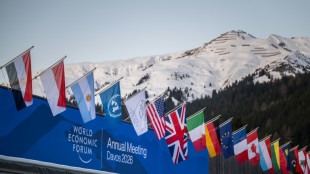
-
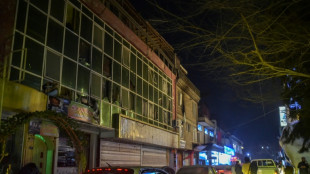 Blast at Chinese restaurant in Kabul kills 7
Blast at Chinese restaurant in Kabul kills 7
-
Warner hits 'Sinners' and 'One Battle' tipped for Oscar nominations

-
 Colombian paramilitary-turned-peace-envoy sentenced over atrocities
Colombian paramilitary-turned-peace-envoy sentenced over atrocities
-
Gilgeous-Alexander leads Thunder in rout of Cavaliers

-
 Seahawks blow as Charbonnet ruled out for rest of season
Seahawks blow as Charbonnet ruled out for rest of season
-
Kostoulas stunner rescues Brighton draw after penalty row

-
 Man Utd greats tell Martinez to 'grow up' as feud rumbles on
Man Utd greats tell Martinez to 'grow up' as feud rumbles on
-
LeBron James' All-Star streak over as starters named

-
 Allies tepid on Trump 'peace board' with $1bn permanent member fee
Allies tepid on Trump 'peace board' with $1bn permanent member fee
-
Ninth policeman dies in Guatemala gang riots, attacks

-
 Man City's Foden to play through pain of broken hand
Man City's Foden to play through pain of broken hand
-
Milan Fashion Week showcases precision in uncertain times

-
 Public media in Europe under unprecedented strain
Public media in Europe under unprecedented strain
-
Africa Cup of Nations refereeing gets a red card

-
 Tributes pour in after death of Italian designer Valentino
Tributes pour in after death of Italian designer Valentino
-
Bills fire coach McDermott after playoff exit: team

-
 Chile wildfires rage for third day, entire towns wiped out
Chile wildfires rage for third day, entire towns wiped out
-
Valentino, Italy's fashion king who pursued beauty at every turn, dies at 93

-
 France PM to force budget into law, concedes 'partial failure'
France PM to force budget into law, concedes 'partial failure'
-
Allies tepid on Trump 'peace board' with $1bln permanent member fee

-
 'My soul is aching,' says Diaz after AFCON penalty miss
'My soul is aching,' says Diaz after AFCON penalty miss
-
Ex-OPEC president in UK court ahead of corruption trial

-
 Iran warns protesters who joined 'riots' to surrender
Iran warns protesters who joined 'riots' to surrender
-
Stop 'appeasing' bully Trump, Amnesty chief tells Europe

-
 Central African Republic top court says Touadera won 78% of vote
Central African Republic top court says Touadera won 78% of vote
-
Trump tariff threat has global investors running for cover

-
 Spectacular ice blocks clog up Germany's Elbe river
Spectacular ice blocks clog up Germany's Elbe river
-
Trump says not thinking 'purely of peace' in Greenland push

-
 Syria's Kurds feel disappointed, abandoned by US after Damascus deal
Syria's Kurds feel disappointed, abandoned by US after Damascus deal
-
Man City sign Palace defender Guehi

-
 Under-fire Frank claims backing of Spurs hierarchy
Under-fire Frank claims backing of Spurs hierarchy
-
Prince Harry, Elton John 'violated' by UK media's alleged intrusion

-
 Syria offensive leaves Turkey's Kurds on edge
Syria offensive leaves Turkey's Kurds on edge
-
Man City announce signing of defender Guehi

-
 Ivory Coast faces unusual pile-up of cocoa at export hubs
Ivory Coast faces unusual pile-up of cocoa at export hubs
-
Senegal 'unsporting' but better in AFCON final, say Morocco media

-
 New charges against son of Norway princess
New charges against son of Norway princess
-
What is Trump's 'Board of Peace'?

-
 Mbappe calls out Madrid fans after Vinicius jeered
Mbappe calls out Madrid fans after Vinicius jeered
-
Russians agree to sell sanctioned Serbian oil firm


Greece's ex-king Constantine, end of a dynasty
Greece's former king Constantine II, who died on Tuesday aged 82, was the last member of a century-long dynasty in power when a brutal army dictatorship seized control of the country in 1967.
A descendant of Denmark's royal Gluecksburg family, Constantine ascended the throne in 1964 at the age of 23 during one of the most turbulent periods in modern Greek history.
The country was still bitterly divided 15 years after the Greek civil war, at the height of the Cold War and with anti-communist hysteria and fears of subversion rampant.
- Coup plots -
Most Greeks believe the young king, under the influence of his German-born mother Frederica, aggravated the country's political instability.
His critics argue he enabled the rise of the army dictatorship by clashing with the democratically elected prime minister Georgios Papandreou, encouraging his resignation in 1965.
Declassified US diplomatic cables say Constantine himself may have been mulling martial law in 1967.
They suggest he wanted to head off Papandreou's return to power, alongside his maverick son Andreas, the future firebrand socialist prime minister.
A 1967 State Department wire said Constantine's head of cabinet approached the local CIA station chief three months before the coup, to ask how Washington would react if "extreme measures" were taken ahead of elections in May.
The envoy told the then CIA station chief John Maury "for the present, the loyalty of the army could be relied upon to support a temporary dictatorship".
- 'Worst day of my life' -
In later years, the former king claimed he had done his utmost to avert the political crisis that led to the dictatorship.
He insisted that the putschists had "deceived" the Greek people by claiming to carry out the coup in his name.
Eight months after the colonels had seized power, Constantine organised a military counter-coup that failed.
"It was the worst day of my life," he said in a 2015 memoir released by To Vima weekly. "That day, I saw my first white hair."
Constantine fled to Rome with the royal family, and they moved to London in 1974.
He later said he had chosen not to pursue his counter-coup "because the risk of a general civil conflict was too great".
A senior putschist saw it differently. The ex-king had "plotted clumsily", he said.
But even after the dictatorship took hold, Constantine "seems to have been willing to return to Greece at practically any cost, including co-operation with the junta", historian Mogens Pelt wrote in a 2006 study of postwar Greece.
- Suing the state -
When democracy was restored in 1974, nearly 70 percent of Greeks voted for the abolition of the monarchy in a referendum, ending a dynasty begun by Constantine's Danish-born great-grandfather George I in 1863.
A long legal battle with the Greek state followed, with Constantine -- derisively nicknamed "Kokos" by anti-royalists -- determined to secure compensation for royal property and lands.
In 1991, he was permitted to remove 10 containers of items at the former royal estate of Tatoi near Athens, during the administration of prime minister Constantine Mitsotakis, father of the present premier.
Many of these items were later sold by auction house Christie's, the London-based ex-royals saying their ongoing storage and insurance costs were "impossible to cover".
The overall compensation case was finally settled in 2002 when the European Court of Human Rights ordered the Greek state to pay nearly 14 million euros to the former royal family.
- Rejected by the people -
Constantine was less than a year old when his family fled to Egypt to escape the invading Nazis, who occupied Greece until 1944. He was six when they returned to a devastated country.
As crown prince, he was part of a three-man sailing crew that won a gold medal in the 1960 Rome Olympics, Greece's first in nearly five decades.
A cousin of British monarch King Charles III, godfather to his heir Prince William and brother of Sofia, the mother of King Felipe VI of Spain, the ex-king was an honorary member of the International Olympic Committee from 1974.
Still styling himself "king", Constantine battled poor health in recent years.
He had returned to Greece in 2013, selling the 9,500-square-foot London mansion where his family had lived for four decades.
"I want nothing more than a quiet family life," he told reporters during a 1993 visit to Greece.
In a 2016 Skai TV interview, he said he had never voted in his life, and did not intend to.
"It's too late," he said.
In 2008, an opinion poll found fewer than 12 percent of Greeks favoured a return to a constitutional monarchy. More than 43 percent blamed him for the coming of the junta.
Constantine was married to Anne-Marie -- sister to the Queen of Denmark Margrethe II -- and they had five children.
M.Odermatt--BTB



